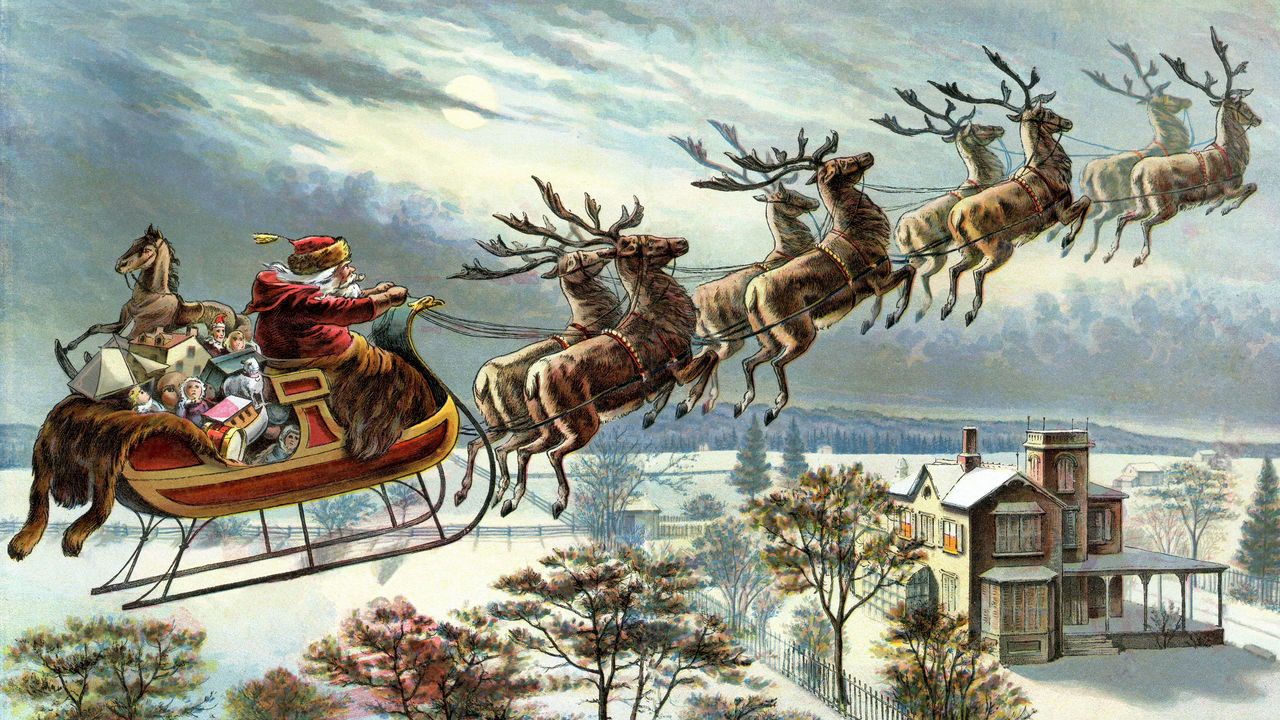What to read about Christmas
Whether you’re sentimental or snarky about the holiday, there’s a book here for you

CHRISTMAS CAN be a trying subject for writers. The saccharine frivolities, rampant materialism and regimented cheerfulness do not naturally lead to the creation of great works of art. Many books about the holiday itself fall into the category of stocking-filler–the literary equivalent of a pair of socks. But others acutely satirise Christmas’s excesses or movingly convey its capacity to inspire beauty and grace. The six books we recommend here, whether soft-hearted or Scrooge-like, brim with curiosity and wit. They promise to entertain readers long after the Boxing Day leftovers have entered the freezer.
The Battle for Christmas: A Social and Cultural History of Our Most Cherished Holiday. By Stephen Nissenbaum. Penguin; 401 pages; $18.95 and £16.99
Christmas is supposedly a time of kindness and forgiveness—something forgotten by the sects and salesmen who have fought to control it. In this rollicking social history, which was shortlisted for the Pulitzer prize in 1997, Stephen Nissenbaum, a historian, charts the surprisingly fierce battle for Christmas’s soul. In early modern Europe, Christmas was a time of bacchanalia: rowdy wassailers celebrated with pints in the tavern rather than carols in the church. Puritans, inevitably, suppressed and even, in Massachusetts, outlawed it. Christmas was merely a “pagan festival covered with a Christian veneer”. The Bible gives no date for the birth of Jesus, the Puritans pointed out. No less inevitably, the holiday revived. In the 1820s Christmas morphed into its modern form as a celebration of domesticity—an evolution inspired not by religion, but by capitalism. Mr Nissenbaum’s book is replete with historical detail, funny and irreverent: it is the literary equivalent of a knowing wink.
Christmas with Dull People. By Saki. Daunt Books Publishing; 48 pages; £4.99
Saki—the pen name of Hector Hugh Munro, an acerbic and brilliant social satirist who died in 1916—loved Christmas. No other occasion offered such rich opportunity to skewer “haute monde buffoonery”. Saki found the holiday to be filled with schmaltz, insincerity and the drudgery of ritual. In this collection of short stories he takes a scalpel to each. The result is a darkly glittering dissection of England’s middle and upper classes: their world of drawing rooms and parlour games is revealed as one of self-satisfaction and shallowness. The stories, which are shot through with a biting wit, will offer respite to any reader who has suffered through tedious family reunions. As one character puts it, “they say that there’s nothing sadder than victory except defeat. If you’ve ever stayed with dull people during what is alleged to be the festive season, you can probably revise that saying.” Another resorts to locking his family and guests in a cowshed.
The Man Who Invented Christmas. By Les Standiford. Crown at Penguin Random House; 256 Pages; $17.00
In September 1843, as The Economist’s first edition went to press in London, a famous 31-year-old writer was beginning a project less than a mile away. The book, “A Christmas Carol”, was published on December 19th. By Christmas eve its initial print run of 6,000 copies had sold out. Charles Dickens’s 66-page novella is now not only embedded in contemporary Christmas culture, it is in many ways responsible for it. From the turkey centrepiece to the greeting “merry Christmas”, “A Christmas Carol” popularised what became the ubiquitous signifiers of Yuletide cheer. But Dickens wrote it at a particularly gloomy time in his life. “The Man Who Invented Christmas”—which was adapted into a film starring Dan Stevens, of “Downton Abbey” fame, in 2017—tells the story of the writer and the work.
The Faber Book of Christmas. Edited by Simon Rae. Faber & Faber; 288 pages; £18
Curled up with this anthology, readers will find much to delight and amuse them in the prose and poetry of such writers as Washington Irving, Christina Rossetti, T. S. Eliot and Jilly Cooper. Ms Cooper writes on the theme of festive-season adultery: “if she suddenly starts looking wonderful over Christmas, and doesn’t put on at least seven pounds misery-eating, the marriage is in trouble.” Some of the best entries moan instead of marvel. George Bernard Shaw declares Christmas to be “an atrocious institution”. Philip Larkin describes how “Christmas idiocy bursts upon one like a slavering Niagara of non-sense”. And Wendy Cope writes: “happy families go to church and cheerily they mingle / And the whole business is unbelievably dreadful, if you’re single.” This compendium of cheerful and dyspeptic writing, loosely arranged by theme rather than in the order in which its pieces were written, is a cut above most festive fare.
Christmas: A Biography. By Judith Flanders. Picador; 257 pages; $16.99
People who make the mistake of visiting a shopping mall in December may be struck by the greed and gaudiness of what is supposedly a religious holiday. But, as this comprehensive history by Judith Flanders, a historian and journalist, shows, Christmas has never been different. Gluttony has eclipsed piety ever since Julius I, who was pope from 337 to 352, decreed that Jesus was born on December 25th. Within a few decades an archbishop whinged that his flock spent the day feasting, boozing and generally making merry. The idea of Father Christmas as a tubby, bearded older man with a sack of presents was popularised, by the Coca-Cola company among others, because it was “commercially expedient for a single image to predominate”. Mr Flanders’s book, which recounts the celebration’s transformation into the festival of today, is rich in delightful details. She unwraps the holiday’s history with the excitement and curiosity of a child opening gifts.
The Christmas Chronicles. By Nigel Slater. Fourth Estate; 464 pages; $35 and £28
Food is at the very heart of Christmas. For many people, the crackle and spit of glistening meat, the waft of cinnamon or the headiness of a pudding “puttering” on the stove are as evocative as madeleines were for Marcel Proust. Writing with mellow beauty, Nigel Slater, a cook and author, captures the nostalgia of festive feasting. He weaves recipes through recollections, creating a book that is as much memoir as culinary ode. Christmas-time readers may find themselves returning to it the following year, “as the season slides into winter, [when] you can feel the heavy, sweet air of autumn turning crisp and clean with each passing dawn.”
Also try
Many sorts of people, from Puritans to pandemic policemen, have tried to cancel Christmas. Our sister magazine 1843 has explained why that can never happen. That won’t stop Americans from squabbling about Christmas; they have been doing that for centuries, wrote our Lexington columnist. Another 1843 article recounts the battle in the music industry for the title Queen of Christmas. The Economist has written about countries where Christmas comes not once, but twice a year. Our Bartleby columnist offered companies advice on how to throw an office bash. ■
More from The Economist reads

What to read about Congo
Six of the best books about an African giant

What to read about dementia
How the disease will change the world and what the prospects are for treating it

Eight of the best spy novels
Former spooks make especially strong authors